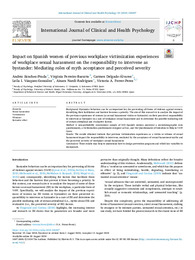Please use this identifier to cite or link to this item:
https://hdl.handle.net/11000/35047Full metadata record
| DC Field | Value | Language |
|---|---|---|
| dc.contributor.author | Nardi-Rodríguez, Ainara | - |
| dc.contributor.author | Sánchez-Prada, Andrés | - |
| dc.contributor.author | Ferreiro Basurto, Virginia | - |
| dc.contributor.author | Delgado Álvarez, Carmen | - |
| dc.contributor.author | Vázquez González, Leila Irea | - |
| dc.contributor.author | Ferrer-Perez, Victoria A. | - |
| dc.contributor.other | Departamentos de la UMH::Ciencias del Comportamiento y salud | es_ES |
| dc.date.accessioned | 2025-01-20T18:45:03Z | - |
| dc.date.available | 2025-01-20T18:45:03Z | - |
| dc.date.created | 2024 | - |
| dc.identifier.citation | International Journal of Clinical and Health Psychology | es_ES |
| dc.identifier.issn | 1697-2600 | - |
| dc.identifier.uri | https://hdl.handle.net/11000/35047 | - |
| dc.description.abstract | ABSTRACT Background: Bystander behaviors can be an important key for preventing all forms of violence against women. Identifying their facilitators and barriers becomes a priority. The aim of this research is to analyze the impact of the previous experiences of women (as sexual harassment victim or bystander) on their perceived responsibility to intervene as bystander in a case of workplace sexual harassment and to determine the possible mediating role of certain attitudinal and evaluative factors. Method: A non-probability convenience sample of 633 Spanish women answered a sociodemographic data questionnaire, a victimization questionnaire designed ad hoc, and the Questionnaire of Intention to Help in VAW Cases. Results: The results obtained indicate that previous victimization experiences as a victim or witness of sexual harassment impact the responsibility to intervene, mediated by the acceptance of sexual harassment myths and the perceived severity of workplace sexual harassment. Conclusions: These results may help to understand how to design prevention programs and which key variables to incorporate | es_ES |
| dc.format | application/pdf | es_ES |
| dc.format.extent | 8 | es_ES |
| dc.language.iso | eng | es_ES |
| dc.publisher | Elsevier | es_ES |
| dc.relation.ispartofseries | 24 | es_ES |
| dc.relation.ispartofseries | 3 | es_ES |
| dc.rights | info:eu-repo/semantics/openAccess | es_ES |
| dc.rights | Attribution-NonCommercial-NoDerivatives 4.0 Internacional | * |
| dc.rights.uri | http://creativecommons.org/licenses/by-nc-nd/4.0/ | * |
| dc.subject | Sexual harassment | es_ES |
| dc.subject | Victimization | es_ES |
| dc.subject | Witnesses | es_ES |
| dc.subject | Bystander effect | es_ES |
| dc.subject.other | CDU::6 - Ciencias aplicadas::61 - Medicina | es_ES |
| dc.title | Impact on Spanish women of previous workplace victimization experiences of workplace sexual harassment on the responsibility to intervene as bystander: Mediating roles of myth acceptance and perceived severity | es_ES |
| dc.type | info:eu-repo/semantics/article | es_ES |
| dc.relation.publisherversion | https://doi.org/10.1016/j.ijchp.2024.100497 | es_ES |

View/Open:
2024-IJHCP-IMPACT ON SPANISH WOMEN (1).pdf
691,38 kB
Adobe PDF
Share:
.png)
